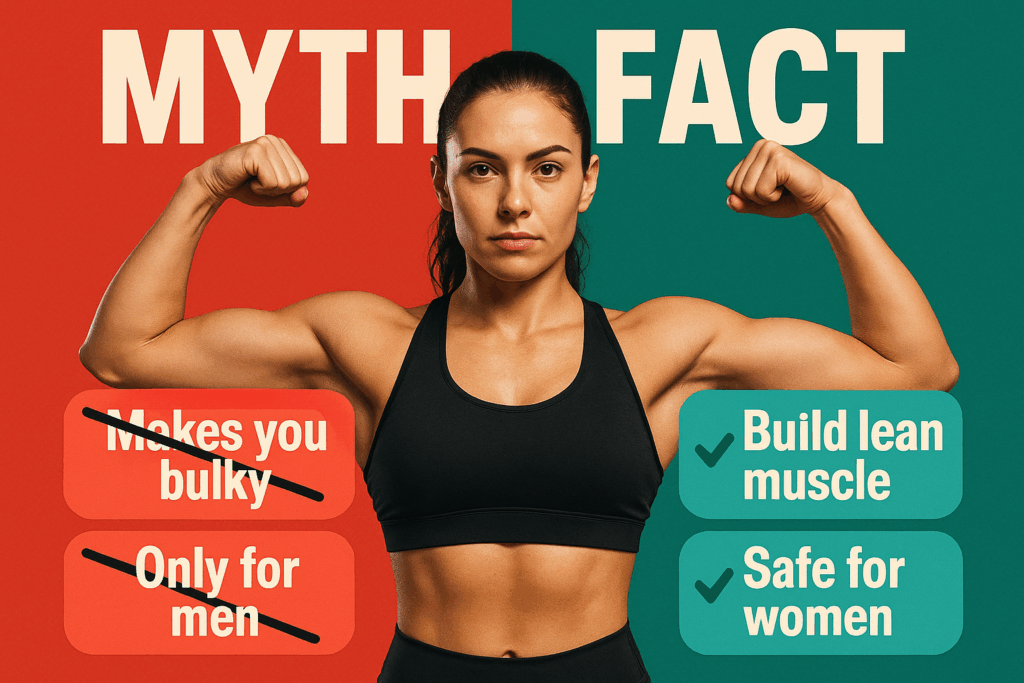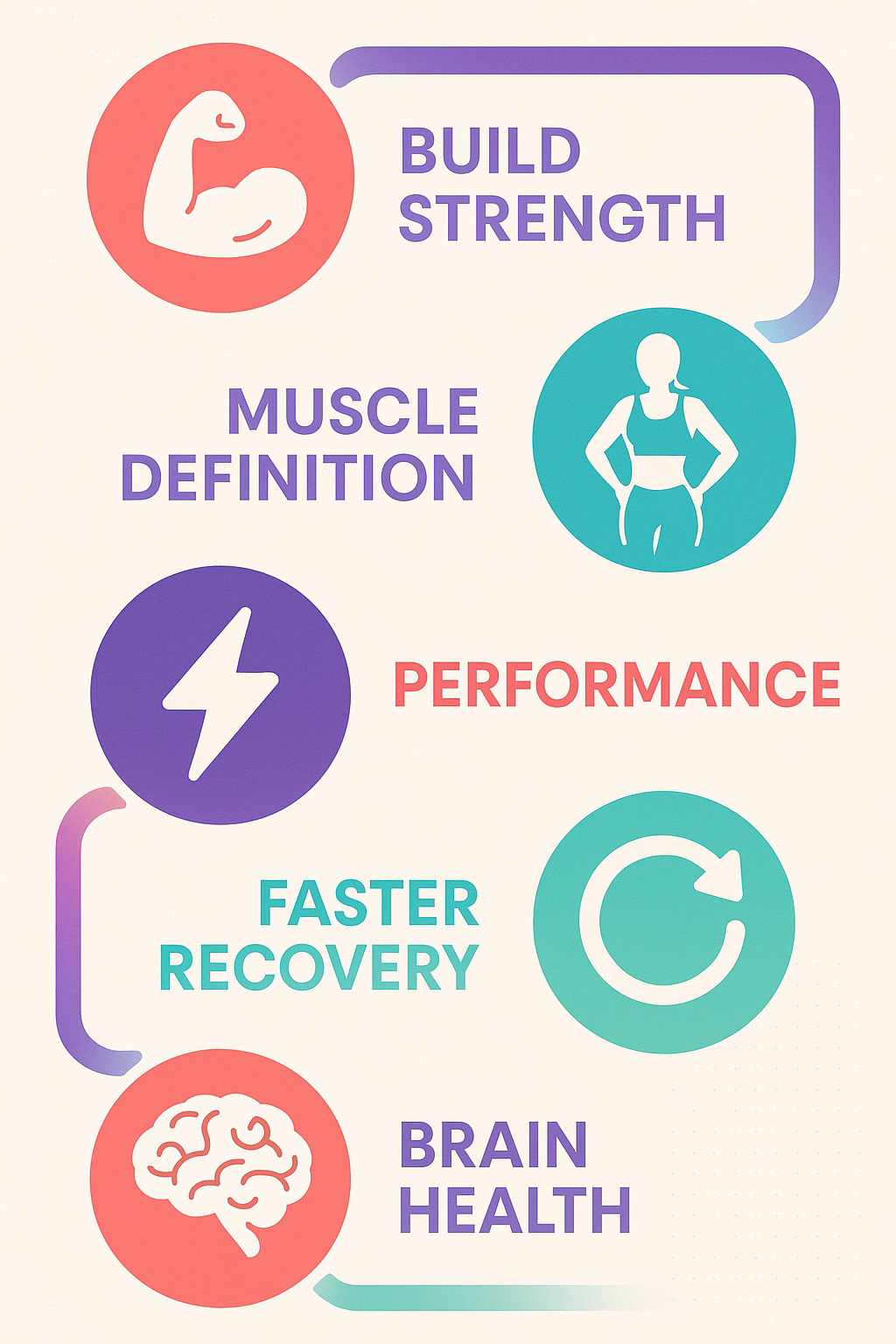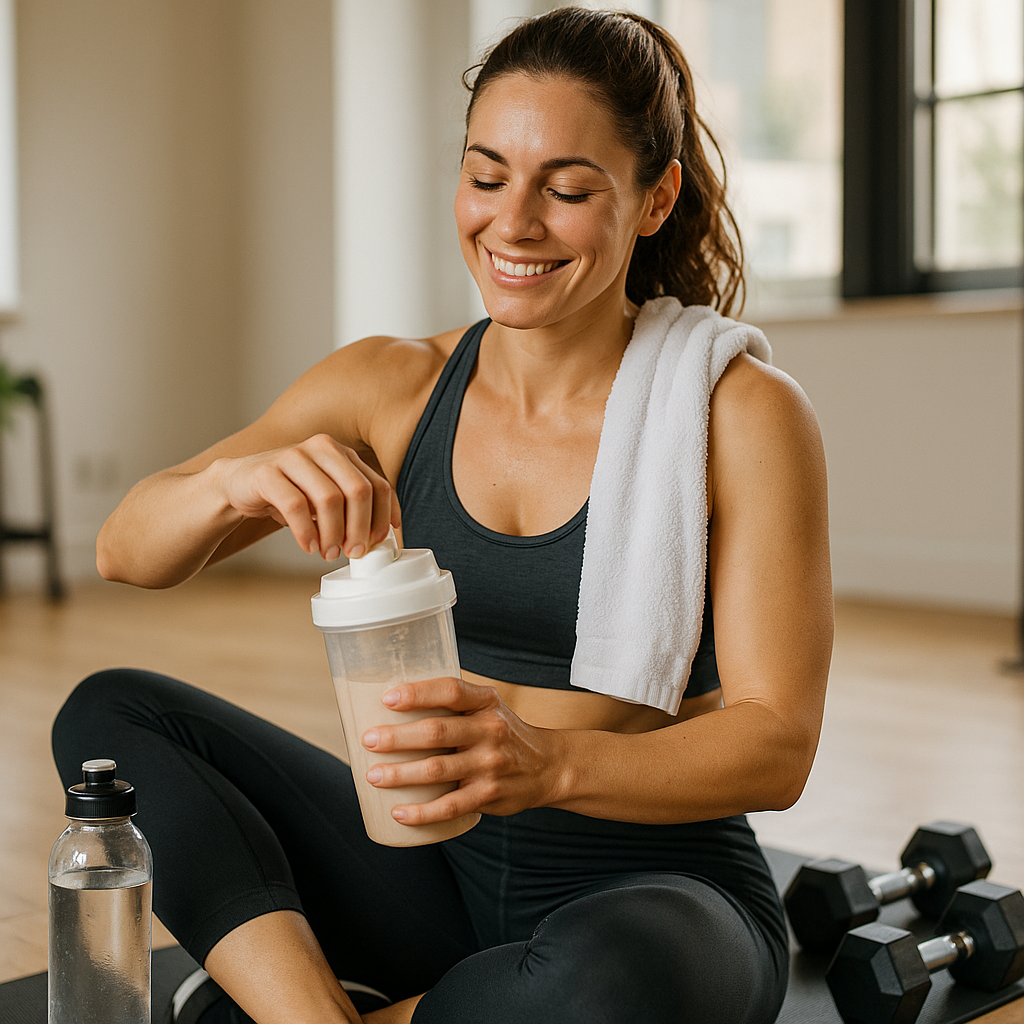Creatine for Women: Your Ultimate Guide to Busting Myths and Getting Real Results
If you’re a woman who’s serious about your fitness, you’ve probably heard of creatine. You’ve also probably heard the rumors: “It’ll make you bulky,” “It’s just for male bodybuilders,” or “You’ll just gain a ton of water weight.”

Let’s be clear: most of that is myth.
Creatine is one of the most-studied supplements on the planet, and the research shows it’s an incredibly safe and effective tool for women seeking to get stronger, build lean muscle, and improve their athletic performance.
Let’s clear the confusion and answer the questions you’re asking.
🤔 First things first: What is Creatine and How Does It Work?
Creatine isn’t some strange, synthetic substance. It’s a natural compound your body already makes and that you get from foods like red meat and fish. About 95% of it is stored in your muscles to be used for energy.
Here’s the simple science:
- Your muscles use a molecule called ATP for quick, powerful movements (like a squat, a jump squat, or a sprint).
- When you use ATP, it becomes “spent” (turning into ADP).
- Creatine’s job is to rapidly recycle that “spent” ADP back into high-energy ATP.
- The result: Your muscles have more immediate fuel. This means you can power through that HIIT class, hit a new PR on your hip thrusts, or push out that final, tough rep.
By supplementing with creatine, you’re just “topping off” your muscles’ natural energy reserves so you can work harder and see better results from that hard work.

💪 The Benefits: What Can Creatine Actually Do for You?
This is where it gets exciting. When combined with your training, creatine can help you:
- Build Real Strength (Not Just “Bulk”): This is the #1 benefit. Creatine helps you get tangibly stronger, allowing you to lift heavier and progress in your workouts.
- Enhance Muscle Tone & Definition: Let’s clear this up: “Muscle growth” doesn’t mean “bulky.” It means building the lean, defined muscle that creates a “toned” look. Creatine helps you earn those results from your hard work in the gym.
- Improve High-Intensity Performance: Feel more powerful and less fatigued during HIIT, spinning, sprinting, or any workout that involves short, intense bursts of effort.
- Speed Up Recovery: Creatine can help reduce muscle cell damage and inflammation, meaning you might feel less sore and more ready for your next workout.
- Boost Brain Health: It’s not just for your muscles! Your brain also uses ATP. Emerging research shows creatine can support cognitive functions like memory and mental processing—a fantastic perk for a busy life.

🧐 Myth vs. Fact: Answering Your Top 10 Creatine Questions
This is the most important part. Let’s bust the myths that stop many women from trying this amazing supplement.
1. Will creatine make me look “bulky”? This is the biggest myth. No. Creatine will not make you “bulky.” That puffy, overly-muscled look you might be imagining comes from a combination of specific (often extreme) training, a very high-calorie diet, and, in many cases, anabolic steroids. Creatine is a 0-calorie compound that simply helps you build lean muscle. It helps you get stronger and more defined, not “huge.”
2. But what about the water weight? Will it make me bloated? Creatine does draw water inside your muscle cells. This is called intramuscular water retention. This is a good thing! It makes your muscles look fuller and more defined, not “puffy.”
Some people experience mild, temporary extracellular bloating (under the skin) during the first few days, especially if they do a “loading phase.” For most women, this is easily avoided.
Pro-Tip: To avoid any potential bloating, skip the “loading phase.” Just stick to a small, 3-5 gram daily dose from the start.
3. Is creatine even safe for women? Will it mess with my hormones? Yes, it is extremely safe. Decades of research on both men and women have shown that creatine is one of the safest supplements available for healthy people. It does not act like a steroid and has no effect on female hormones like estrogen or progesterone.
4. Does creatine cause hair loss? There is no direct scientific evidence that creatine causes hair loss. This myth comes from a single, small 2009 study on male rugby players that found a potential increase in a hormone (DHT) linked to male pattern baldness. This study has never been replicated, and dozens of other studies have found no effect on testosterone or DHT. It’s not a concern for women.
5. What’s the best type of creatine? (Monohydrate vs. HCl, etc.) Keep it simple. Creatine Monohydrate is the most-studied, most-proven, and cheapest form. Don’t waste your money on more expensive forms like HCl or ethyl ester that have no proven benefit over basic monohydrate.
6. Is a “loading phase” necessary? A “loading phase” (20 grams/day for a week) just saturates your muscles faster. It is not necessary and is the main cause of any temporary bloating or stomach upset. We recommend most women skip it.
7. When is the best time to take it? The most important thing is consistency. Take it every single day. Timing doesn’t matter nearly as much as just taking it. On rest days, take it whenever you remember. On workout days, taking it post-workout with your protein shake is a great, easy habit.
8. Is it a steroid? Absolutely not. Steroids are synthetic hormones. Creatine is a natural amino acid derivative that works by providing energy. They are not in the same universe.
9. Is creatine beneficial for women as they age? Yes! This is a huge, often-overlooked benefit. After menopause, declining estrogen can accelerate the loss of muscle mass and bone density (sarcopenia and osteoporosis). Creatine, combined with resistance training, is a powerful and proven tool to help combat this by supporting muscle retention, strength, and even bone health.
10. Does creatine cause dehydration or cramps? No. This is another old myth that has been disproven. By pulling water into the muscle, creatine actually improves your cells’ hydration status. Studies show it does not cause, and may even help prevent, dehydration and cramping. Just be sure to drink your normal amount of water.

📝 How to Take Creatine: The Simple Plan for Women
Ready to start? It’s simple.
- Get the Right Stuff: Buy a container of Creatine Monohydrate. “Micronized” is a good choice as it dissolves easily.
- Take Your Dose: Take 3-5 grams per day. For most women, 3 grams is a perfect daily dose. (That’s about 3/4 of a standard teaspoon).
- Be Consistent: Mix it into your water, protein shake, or even a cup of (not-too-hot) tea. Take it every single day, including rest days.
- Be Patient: It takes about 3-4 weeks of daily use to fully saturate your muscles. This is not an instant-energy pre-workout; it’s a supplement that builds up over time to improve your entire system.
The Bottom Line
Creatine isn’t a magic wand. It’s a key. It unlocks the next level of results from the hard work you’re already putting in. It helps you build strength, not bulk. It helps you look defined, not puffy.
If you’re ready to hit new PRs, feel stronger in your workouts, and see more lean, toned results, creatine is one of the most proven partners you can have on your fitness journey.
Disclaimer: As with any supplement, it’s always a good idea to consult with your doctor or a registered dietitian before starting, especially if you have any underlying health conditions.





 Previous Post
Previous Post Next Post
Next Post